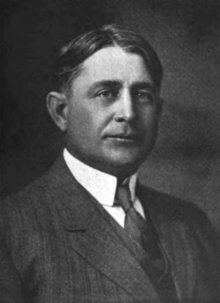James Cornwall
Lieutenant-Colonel James Kennedy "Peace River Jim" Cornwall DSO (October 29, 1869 – November 20, 1955) was a provincial politician from Alberta, Canada. He served as a member of the Legislative Assembly of Alberta from 1909 to 1913 sitting with the Liberal caucus in government.
James Cornwall | |
|---|---|
 | |
| Member of the Legislative Assembly of Alberta | |
| In office June 30, 1909 – March 25, 1913 | |
| Preceded by | Thomas Brick |
| Succeeded by | Alphaeus Patterson |
| Constituency | Peace River |
| Personal details | |
| Born | James Kennedy Cornwall October 29, 1869[1][2] Brantford, Ontario |
| Died | November 20, 1955 (aged 86) |
| Political party | Liberal |
| Occupation | soldier, fur trader, politician |
Political career
Cornwall ran as a provincial Liberal candidate in the 1905 Alberta general election in the Peace River electoral district.
He faced independent candidate Lucien Dubuc but was defeated by an unknown number of votes despite being favored to win. The election results were annulled by the Executive Council of Alberta as there were significant irregularities in the vote and a new writ was ordered. Cornwall ran in the ensuing by-election held on February 16, 1906. This time he would face Independent Liberal candidate Thomas Brick, who easily defeated him.
Cornwall would be returned to the Alberta Legislature by acclimation in the 1909 Alberta general election and hold the seat for a single term as a member sitting with the Liberals.
Cornwall would be sued while still a member in the Legislature. On May 13, 1910 he filed his defense in provincial court. Cornwall was named in a lawsuit by Toronto business man Alfred Hawes who was looking to recoup more than $250,000.00 lost in transactions from the Alberta and Great Waterways Railway Scandal.[3] The same scandal would cause the resignation of the entire Rutherford cabinet days later. Cornwall would leave the Liberal cabinet and sit as an Independent.
At the outbreak of World War I, Cornwall went to fight overseas. While he was over in Europe he would run in the 1917 Alberta general election non-partisan Soldiers' and nurses vote. He ended up finishing fourth in a large field of candidates. He was awarded the Distinguished Service Order in the 1918 New Year Honours.[4]
After the war Cornwall ran in a by-election in the Athabasca district in a 1920 by-election as an Independent. He was easily defeated by Alberta Liberal George Mills. He ran again less than a year later in the 1921 Alberta general election but was defeated finishing in 16th place out of the 26 candidates.[5]
The Social Credit government under William Aberhart tried to entice Cornwall to run for a seat in the Legislature under their banner for a by-election in Athabasca, to which Cornwall had declined.[6]
References
- "J.K. Cornwall files his defense". Calgary Herald. May 14, 1913. Retrieved August 11, 2007.
- "No. 30450". The London Gazette (Supplement). January 1, 1918. p. 28.
- "Edmonton Official Results 1921 Alberta general election". Alberta Heritage Community Foundation. Retrieved April 29, 2010.
- C.H. Stout (September 21, 1938). "Jim Cornwall S.C. Candidate?". Vol XXXI No 238. The Lethbridge Herald. p. 1.